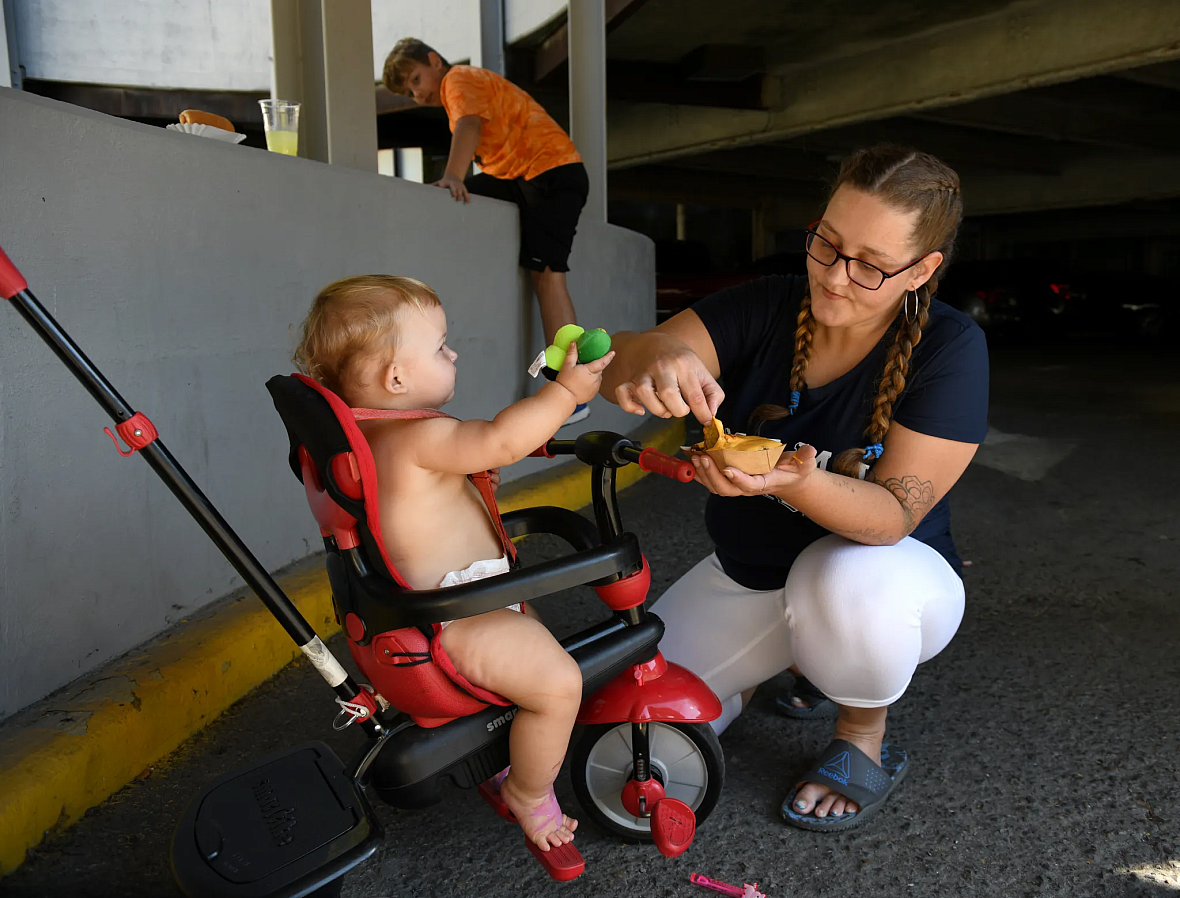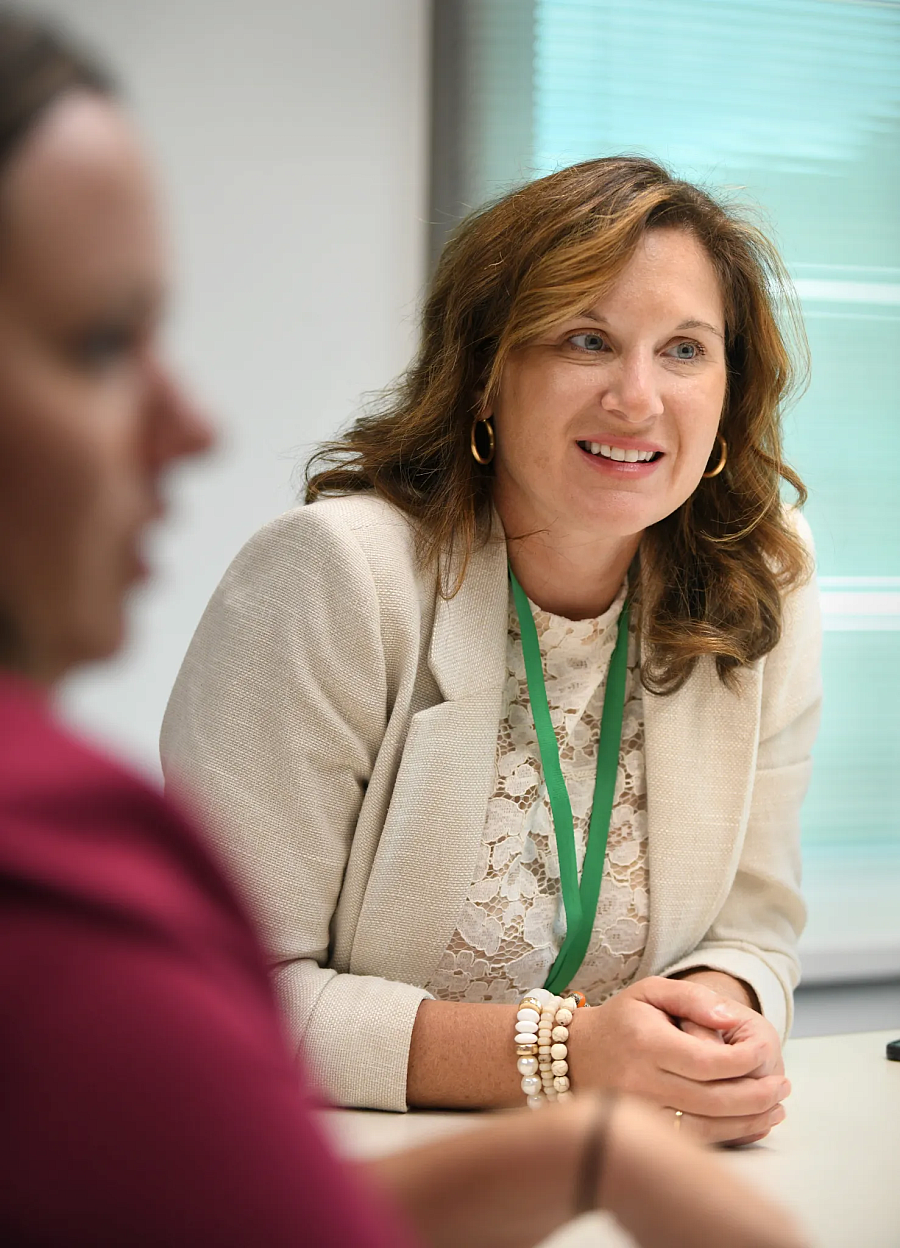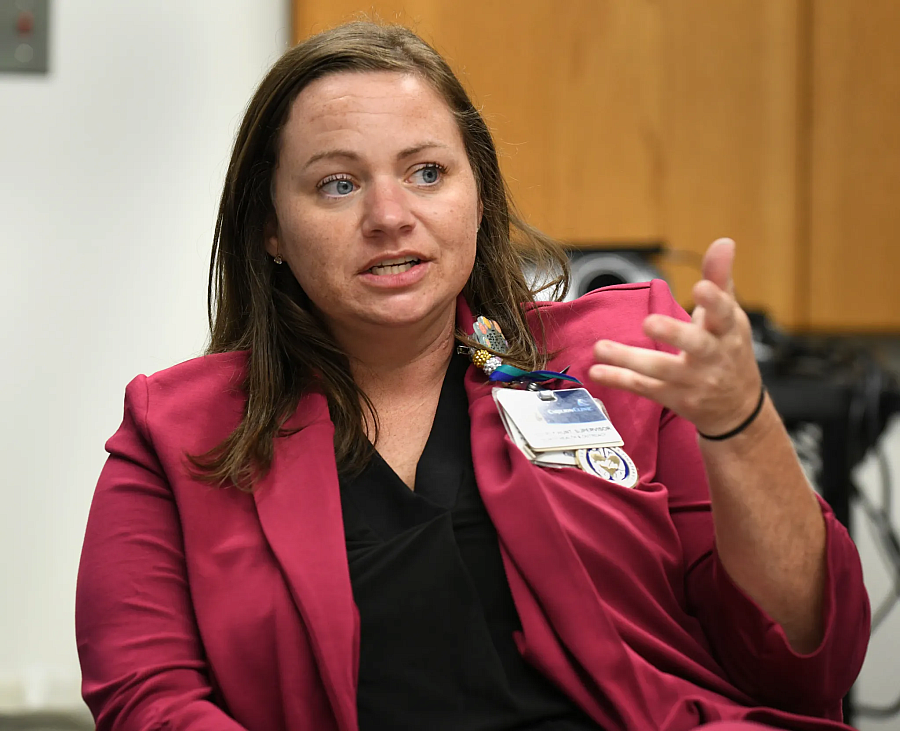‘Please let this be the last time’: Pregnant women battling addiction in Southwest Virginia face barriers to care despite available funds
The story was originally published in Cardinal News with support from our 2024 National Fellowship and the Fund for Reporting on Child and Family Well-Being.

Miracle Hawkinberry gives her daughter Honey Stacy, 14 months, a snack while they take shelter from the heat in a parking area during the Family Agriculture Day at the Grundy Community Center recently. Miracle's son Chevy Miller is in the background.
Photo by Natalee Waters
When Dr. Kim Simcox doesn’t know how to relate to one of her patients, she calls Kim Hunt.
“Every time, I’m like, ‘What are you doing right now?’” Simcox said, laughing across the table at Hunt. They’re sitting in a conference room at Carilion Roanoke Memorial Hospital on the 13th floor. Outside the door is a quiet hallway lined by state-of-the-art birthing suites. Inside of them are a recliner, a deep soaking tub beneath large windows, a hospital bed and enough room for a full health care team to assist with welcoming a new life.
Whenever those calls come, Hunt is quick to respond, showing up to meet the patient and offer her support.
“It’s like the bat signal,” Simcox said.
Simcox is double board-certified in obstetrics-gynecology and addiction medicine, treating patients with typical pregnancies while also becoming a strong advocate for pregnant women battling addiction.
That’s where Hunt comes in. Her team of four peer support specialists has personally walked the path of addiction and recovery and help Simcox bridge the gap and build trust with the women she treats.

Dr. Kim Simcox, founder of the Women’s Emerald Program at Carilion Clinic in Roanoke.
Photo by Natalee Waters
She’s part of a movement to build strong supportive services for pregnant women with addictions in the region’s urban center. That includes an inpatient care center project in Roanoke where women will be able to stay for up to six months, removing themselves from unhealthy homes and relationships to get clean and stay that way for their babies.
But in the far mountains of Virginia, where substance use rates have soared, pregnant women are finding little support and still much stigma in helping them treat their substance use and deliver healthy babies.
The challenges to understanding and treating these patients are difficult even in Roanoke. In Buchanan County, over 150 miles to the west, a woman named Miracle, pregnant and hoping to free herself from addiction in time to save her baby, would not find a healthcare dynamic duo like Simcox and Hunt to help her.
Miracle Hawkinberry was on her own.
* * *
Grundy is a small town nestled deep within the rugged valleys of the Appalachian Mountains. Approaching from the east, visitors follow narrow, winding roads that hug the curve of the valley.
The Buchanan County Courthouse in Grundy, described on Wikipedia as “the only building in the downtown with pretensions to architectural sophistication,” features a sandstone facade that contrasts with the dark, densely forested mountains rising steeply behind it. To some, the Renaissance Revival building may look like a fortress; to others a mansion; to still others, a prison. Serving as a vital center for civic life, it houses county courtrooms, administrative offices and important public records.
The unincorporated community of Oakwood, where Miracle Hawkinberry lives, is a 14-mile drive to Grundy, on winding U.S. 460.
When Hawkinberry, 30, walked through the courthouse doors to attend her first drug court in June 2023, she didn’t have a driver’s license. She had to rely on someone else to get her there. Over the coming months she’d have to rely on others to get to her twice-weekly drug screenings and her weekly court appearances. She also had to complete 25 hours of community service every week and attend Narcotics Anonymous meetings. At the same time, she was caring for her newborn baby.
“It took me a while to be able to, like, get up and do things. I could get up and do what she needed, but like community service and stuff that I have to do for drug court, it took me a while to be able to have the energy to do those things,” Hawkinberry said. “They’ll give you a hard time, but they can’t make it easy for you. You know what I mean? You have to have a hard time if you’re going to change,” Hawkinberry said.
It’s a hard time that changed Hawkinberry and her baby’s life for the better.
Hawkinberry has been sober for 16 months thanks to the drug court program. It’s taken her over a decade to get to that change by herself.
* * *
When she found out she was pregnant with her youngest daughter at the end of 2022, Hawkinberry didn’t have power or water at her home, she was unemployed, her partner was in jail for a probation violation and her grandmother, who’d raised her, was on life support in Richmond.
Hawkinberry was using oxycodone and meth at the time. She continued to use for the next several months. Although she attended her prenatal appointments, her distrust in the health care system prevented her from disclosing her substance use.
She prayed to God for help, even as she continued her drug use. “Please let this be the last time. I don’t want to keep doing this, please let this be the last time,” was her prayer every time.
“If you’re getting high when you’re pregnant and if you’re risking your baby’s life, you know that you’re at the bottom, but you can’t stop. You know, you can’t stop.”
In March 2023, she was arrested for violating the terms of her probation. Hawkinberry asked to enter drug court for treatment. The drug court program connected her with a peer support specialist who drove her to the courthouse and to appointments for her newborn.
The structure and accountability provided by drug court helped Hawkinberry secure a job, regain her driver’s license and commit to long-term recovery. But if she ever were to relapse or face legal issues again, she risks losing custody of her baby, along with any hope of regaining parental rights of her twins, born six years earlier and removed from her custody when they were born with drugs in their systems.
In Buchanan County, where Hawkinberry lives, 19% of households in the region live at or below the federal poverty line, compared to 10% across the state. According to 2022 state data, Southwest Virginia reports some of the highest rates of neonatal abstinence syndrome, or NAS, in the state; that’s when newborns experience withdrawal symptoms because they were exposed to drugs in utero. In Buchanan County, newborn hospitalizations due to drug withdrawal in the infant were nearly seven times the state average.
It took an arrest to bring her the opportunity to find an answer to her prayers.
There’s hope, as the county has received hundreds of thousands of dollars from the state’s opioid abatement fund in 2024 alone, that some pregnant women may not have to go through drug court to get the help and health care they need. But the strings attached to that money make it hard for smaller counties to play the game needed to spend the funds.
And money alone won’t change the stigma that those women face from the very people whose mission is to care for them.
* * *
Simcox sometimes finds it hard to connect with her more vulnerable patients, despite her formal training, because she hasn’t lived through the experience of addiction herself.
Her colleague, Kim Hunt, finds it hard to believe that she’s leading a team reaching out to those patients, given her early struggles with addiction. That history was so bad, she said, she could hardly believe she was even allowed on the property when she first began volunteering at Carilion.
“It made me feel like I was meant to go through all these trial and errors to do this now,” Hunt said.

Kim Hunt, peer support team supervisor at Carilion Clinic in Roanoke.
Photo by Natalee Waters
When Hunt graduated high school, she planned to attend college on a basketball scholarship, but those dreams were derailed when she started using heroin. Her addiction quickly spiraled, leading to methamphetamine use, and after running into legal trouble, she turned to synthetic bath salts — stimulant drugs that were once legally sold in tobacco shops across the country and mimicked the effects of stronger substances.
Recovery didn’t come easy, and at first, doctors didn’t know how to help her, Hunt said.
In and out of rehab, it took multiple attempts before Hunt experienced a shift. She started medication-assisted treatment for her opioid addiction, rekindled relationships with her family and got a job at a gas station.
Six months into her recovery, she found out she was pregnant.
The news was exciting, and she felt like she was ready to start a new chapter. Even though her doctor knew she was doing well in her recovery, she could still feel the judgment during her appointments, she said.
Soon after finding out she was pregnant, she tested positive for hepatitis C, a blood-borne virus that’s spread through exposure to infected blood or bodily fluids. The diagnosis was embarrassing, she said.
“You could tell [the doctors] wanted to say something, but they didn’t, or you could hear them outside the room,” Hunt said. “Then, even when I was delivering … they asked me, ‘So, do you think you’re going to stay in recovery?’”
Hunt has been in recovery for 12 years now, but without access to doctors who could manage her complex pregnancy and provide the medication assisted treatment for her substance use disorder, things could have ended up differently, she said.
Hawkinberry’s road without that access was full of good intentions and devastating failures.
* * *
Hawkinberry had tried to get help for her substance use disorder before she found out about her previous pregnancy in 2017 and was taking Subutex, a medication approved by the Food and Drug Administration that helps prevent withdrawal symptoms from opiates and reduces cravings.
She continued taking Subutex while pregnant with twins. Before Hawkinberry saw an OB-GYN about her pregnancy, her doctor warned her about the stigma she might face from other providers.
“The doctor that I was seeing for the Subutex, he told me ahead of time that because I was on Subutex that the doctors for the baby would treat me different, and they did,” Hawkinberry said. “They were just rude. It felt like I didn’t matter.”
Hawkinberry felt that the doctors didn’t clearly communicate her treatment plan while pregnant, and the lack of trust and attention only deepened her reluctance to open up about her drug use.
Lack of trust and understanding between doctor and patient can create barriers to care, especially for pregnant women who are already afraid of judgment or legal repercussions.
Subutex is generally considered safe to use during pregnancy and is often prescribed to help people ease off opiates, according to the Recovery Research Institute, but it’s still a controversial topic among some health care professionals.
Critics of medication-assisted treatment for opioids worry about potential side effects on the unborn child, noting that while these treatments can help manage addiction, babies can still be born with drugs in their system.
Subutex has minimal potential for abuse, but some people may develop a tolerance to it, which can cause them to seek other substances.
* * *
Hawkinberry began taking more Subutex than prescribed and ran out of her medication. She started buying oxycodone from her drug contacts. She never told her doctors what was happening.
On top of that, her pregnancy was fraught with uneasy feelings about her living situation.
“The father of the twins was abusive, and, honestly, I was going to give them up for adoption,” Hawkinberry said. “There was no way I could be with him and have them. I was like, ‘I can’t be tied to him forever like this.’”
It was the second time that Hawkinberry struggled to end her addiction because of her living situation.
When she became pregnant the first time, it was 2013. Hawkinberry was 19 years old and married to a man who provided easy access to oxycodone and other street drugs. She learned at the doctor’s office that she was already eight months along.
She stopped using drugs, even cigarettes, during that last month of pregnancy, but she never told the doctors about her substance use history.
“It was fighting all the time trying to get [my husband] to stay home and be with us,” Hawkinberry said. “Couldn’t slow him down, so I joined him.”
* * *
It’s important for patients to have a safe environment to return to if they start medication assisted treatment for opioid use disorder, said Simcox.
“If I’m expecting my mom to go back to a place where she lives with [someone] who taught her to inject drugs, I’m not setting her up for success,” Simcox said.
This is where residential treatment programs that also offer child care can make a difference. However, for people like Hawkinberry, who live in far Southwest Virginia, it’s a long journey. Uprooting a family for six months of treatment is a significant challenge.
* * *
At a table in the Buchanan County Courthouse in September 2024, Hawkinberry reached out protectively to pick up the blond-haired, blue-eyed baby, the poke-and-stick tattoos along her arms indelible reminders of her own struggles and time spent in jail.
That’s all in the past now, Hawkinberry said.
“I know what I want my life to be, and I’m going to have it.” She still attends drug court, and will through December. She still faces the risks of running afoul of the system. She’s one mistake from having her infant taken away, losing all chance of regaining visitation rights to her twins and contact with her oldest child.
“That feels like it was so long ago. I’m better now, and I know it’s going to be a good life.”
She takes every opportunity to spend time with her kids, she said. She takes them to fairs. She has her oldest son for overnight visits now. These typical scenes of happy and responsible parenting may seem so normal as to be boring to those who haven’t walked in her shoes.
One would have to be familiar with the throes of addiction, from a place out of reach for state-of-the-art health care, to know what a miracle those moments of normal life are.

